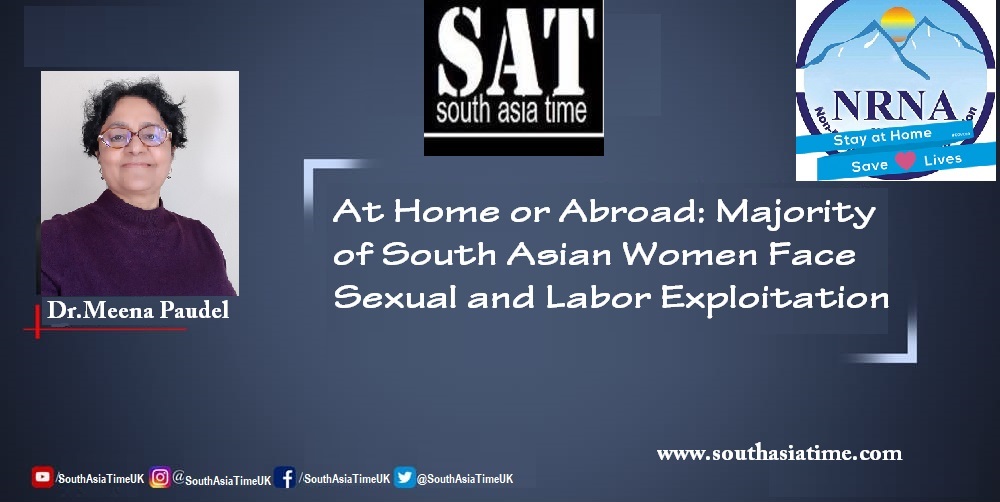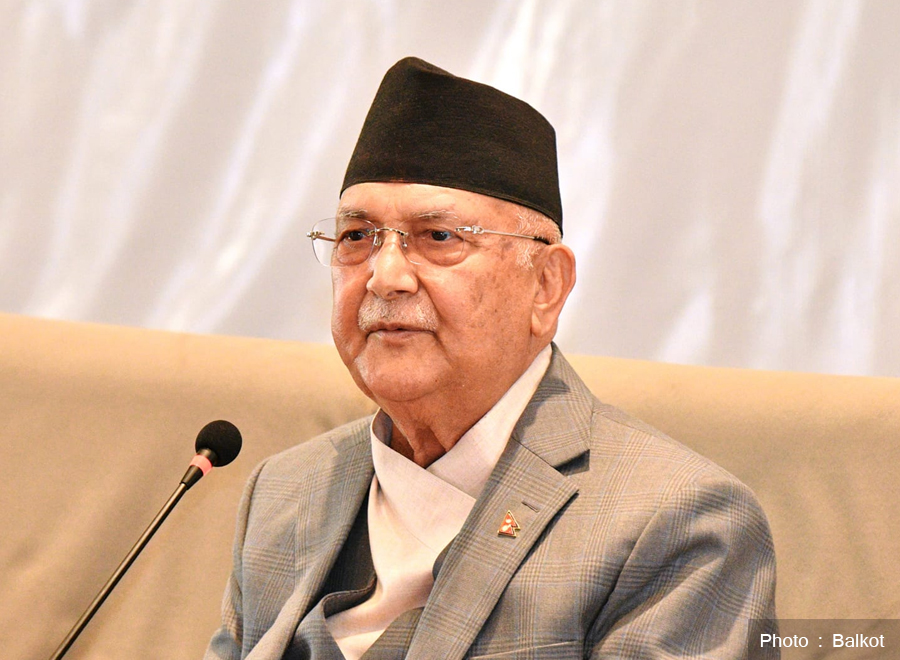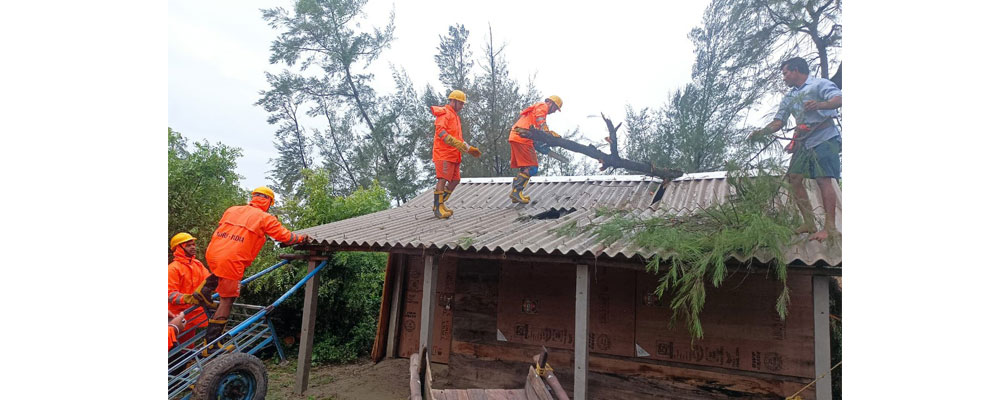‘Women will bear the brunt of the corona crisis’


MEENA POUDEL, Ph.D., is a Nepali sociologist, has a long and committed history of development works and feminist activism on issues affecting lives of socially excluded and politically marginalized groups in Nepal and other parts of the south, southeast and central Asia, western Europe, and North Africa with various national and international organizations, UN systems, women’s rights networks, and NGOs. Dr Poudel is a practitioner with academic vigour. In recent years she is engaged more in understanding various aspects of the lives of women, men and children vulnerable to and experiencing unregulated migration in central Asia and North Africa. She has authored a book Dealing with Hidden Issues: Social Rejection Experienced by Trafficked women in Nepal. Currently,
she is working with the UN Migration Agency (IOM) in Libya. During her recent visit to the UK, she spoke with SAT Executive Editor DR. KRISHNA UPADHYAYA on contemporary issues. Excerpts of the interview:
The corona virus pandemic has once again showed that poor and marginalised communities including women bear the biggest brunt. Do you think the time has come to rethink our overall
development paradigm?
I think you have raised very important question. Women, in general, have been discriminated socially, economically, culturally and politically just because they are women and state mechanisms whether they are social welfare framework or corporate capitalist framework are interpreted and enforced from masculine perspective, it is just matter of degree and nature, the world we live in is increasingly becoming a place where space for equality and equity is shrinking. Any emergencies we have encountered; they are the women and men those are at the margin of the social hierarchy suffer and women in particular are the one who bear the biggest brunt. This is proved by various natural and human made disasters globally and now we are facing public health pandemic – the COVID- 19. We are still at the initial stage of the pandemic and entire world is now in a lockdown stage, social interactions are almost limited to family, economic activities are almost paralyzed and state services are badly affected to reach out to the neediest. We have evidences coming out already that gender-based, domestic violence in particular, at family level has gone up since the lockdown began. This once again has proved that family is not anymore safe place for women because most of the violence occurs at family level and by their nearest and dearest.
So, how severe could be the economic impact of this crisis?
Although we are yet to document the economic impact of COVID-19 response strategies being adopted at the moment on women, however, my initial analysis is that when labour market opens, it will be the women workforce, both locally and as migrants, losing the job. Think for a minute, you face domestic violence at family level and if you are working out of home and you lose your work, what is left for women to survive and support themselves ? this is one scenario. Another scenario would be men too will be losing job due to COVID-19 which will have huge impact at family level which, as aconsequence, will contribute to reduce family budget – the cost of education, health and
other basic services and finally the losers will be the women eg daughters will be the first leaving school, wife will be the one depriving from health services and food intake. Similar situation will be replicated at state level as well where state will further cut welfare related budgets e.g. education, health, agriculture and possibly pension benefits for senior citizens, women, people with different
abilities (mental, physical, single female) as well to recover national economic deficit. So, in summary, post COVID-19 world may potentially be look like with less welfare and more capital recovery framework which will be unfortunate for people in general and entire populations of developing world. But in reality, governments should be taking post COVID-19 pandemic as an
opportunity to review their development frameworks and focus more on social welfare modality putting marginalized men and women at the center of the development policies. This is so crucial for countries like Nepal which has been just moving out from traditional and feudal social and economic paradigm to market led capitalist framework. In addition, we must not also forget that Nepal’s economy is largely dependent on migration-led resources – remittances – which no doubt will suffer in post COVID-19 phase as millions of jobs our migrants are holding at the moment will disappear and new opening will be for domestic labour of the destination countries to respond to the COVID- 19 led unemployment. So, governments must review current development policies, plans and strategies by placing large segments of the society at the center.
You have studied about women’s movement in Nepal from close quarters. What do you think should Nepal’s women’s movement should prioritize so as to address the risk migrant women are facing including forced labor and trafficking.
Well, women’s movement of Nepal first needs to acknowledge the key gender issues that are:
I) legal subordination of women to men, ii) economic dependency to men,
iii) cultural obligation to protect izzat and, iv) low social position than men in family, society, market and the state.
The problem, though, is that women’s movement is largely working on agendas set by NGOs and as you and I have experienced working with NGOs, we know the process of setting agendas for NGOs, and by whom. It is their donors! Who are the donors then? The western countries sponsoring NGO activities, therefore, the agendas are not so much grounded with local reality and we don’t get right when it comes to addressing the root of the problem. Women’s movement should have a political perspective on gender agenda and guide the NGOs and women’s rights groups to campaign instead.
Also, I will not blame so much to leaders of women’s movement as they are also marginalized within their respective political parties, the parties are always led by a handful of men representing a certain social class of Nepali society who have always been guiding the political process from a masculine viewpoint. In this situation, how women political leaders can make their agenda?
Let me come to your question on migrants and trafficked women issues. Issues of migrants and trafficked women experience more violence as they leave home to support the family and also to escape domestic violence, abusive relationship within the marriage but what they get away from home – sexual and labor exploitation. When they return home there is so much social and cultural stigma because of their absence in the family. In my research, it came out very clearly that money sent by migrants and trafficked women are happily accepted by their families but when they return home women, particularly women who have experienced irregular migration such as trafficking and smuggling, are not accepted by family and society at large. Going back to my point about cultural obligation women are imposed to protect izzat (honour) of their families, these women on their return from difficult migration processes are seen with distrust. However, this is not to generalize with thousands of migrants’ women sustaining their family economy are gradually being accepted and welcome home although they are still not given equal status as their male counterparts back home.
What brought you this time to the UK ?
My purpose in coming to the UK this time was to speak to an International Seminar on Women Empowerment organized by Women’s Forum of Non-Resident Nepali Association (NRNA) National Coordination Council of UK to mark International Women’s Day 2020. During my visit, I also took the opportunity to discuss broader strategy of women’s forum to continue thematic discussions within the broader role of NRNA, particularly women members to share knowledge and skills with women’s rights activities in Nepal and academic scholars with the aim of NRNA’s contribution to the cultural transformation of Nepali society towards women’s rights. Although drafting a strategy couldn’t happen due to growing public health pandemic and my own limited time but some discussion has initiated which can be continued once situation returns to normalcy, if NRNA is willing to develop a strategy.
How do you find women leadership in the NRNA UK, how independently they were doing, and how was the involvement of youngsters?
Frankly speaking, I found the women leadership at the NRNA UK as an amazing team, they are clear on their roles, have a short and medium-term vision for the organization which can be broadened for a longer-term strategy, capable to decide within their scope of NRNA roles however as you know they were grown up in a society back home in Nepal that still holds narrow views on women’s leadership, doesn’t accept women emancipation in a real sense, Nepali society that is yet to accept women’s autonomy in practice and women’s agency is still attached to men’s identity instead.
Wherever people migrate, people do carry their original socio-cultural inheritance with them. Working with migrants of various parts of the world, I have observed this cultural legacy of the origin with other migrants as well so what I have observed throughout the program and also heard some of the comments on NRNA UK’s current leadership by some male and female NRNs did not surprise me because I am aware of where they come from. But what surprised me were broader perspectives, creative ideas and critical analysis of the younger generation of the NRNA. These youngsters are looking for their meaningful role in the NRNA, space to contribute to its goal, opportunity to change the image of NRNA and redefine NRNs role corresponding with their vision to contribute to their society at the root (back in Nepal). This is something crucial that the NRNA UK’s leadership may need to consider working by involving the young generation of the NRNA.
Could you please shed light on women’s identity/construction which you presented in the NRN conference with a little bit reference in the global context?
As the banner theme of the day was ‘Empowerment of Women’, although, it was a vague theme but was divided into two sessions: Presentation around the theme in which my focus was on ‘Socio- cultural construction of personhood in contemporary Nepal’, findings of my research work in Nepal.
And the second session of the programme was a thematic and powerful panel discussion entitled: ‘Inter-Generational Perspective on Contemporary Feminism’. I understand these sessions were planned in a way that participants of all walks of life can engage with discussion, most importantly the youngsters those have limited real-life experience of being in Nepal. The panel discussion was followed by a presentation and a lot of questions from the participants were around presentations of speakers which allowed speakers to expand their arguments with examples.
In both the sessions my focus was to highlight key gender issues contemporary Nepal has been encountering, it was important for diaspora communities to understand the key issues that are shaping identities of their relatives, families and fellow citizens back in Nepal. As a social science scholar, you too are probably aware that Nepali women are still not recognized as autonomous
individual citizens legally due to our citizenship provision. Current legal provision shaping women’s identity in Nepal has fundamentally been contributing to continued women’s economic dependency on their male counterparts in the family, most importantly to their fathers, husbands, and brothers.
Consequently, women are constantly being pushed into more cultural violence such as domestic abuse, social discrimination, and cultural marginalization. Such trapped women are brought into legally, economically, socially and culturally has the link of broader political exclusion which always put women in a lower position than men and forced women to follow men’s instructions rather than using women’s knowledge, personal views and ideas to build their social institutions such as family, community and the state. We have thousands of examples to validate this argument, but one key and painful example is, women are seen as key to protect izzat of their families but not counted as a full citizen of their own country unless men validate their identity as a daughter, wife, sister or similar feminine role. One of the questions constantly raised by the young NRNs in the discussion was why this is still happening in Nepal as the country has far ahead politically and so much happening in the economic sector/market as women are seen as key labor force? My response to this question was yes but women are seen only as resource generators when a family is in need, but women are not the decision-maker in the real sense when it comes to where to invest resources they have generated and for what and why.
Look at our land reform law and certification to women, do you think women are even consulted to sell or use of land that is legal in her name? The answer is no. I am not talking about exceptional cases, I am talking about ordinary women in Nepal. Let me summarize my response to your question: Nepali laws including the current constitution and subsequent acts are drafted technically in legal terms, defined and interpreted by our judges based on their cultural and often feudal mindsets and enforced based on political prejudices based on gender, sexuality, socio-cultural and economic status background of the survivors of violence and her offender.
In the second part of your question about global scenarios, well, I worked in various parts of the world and observed violence and discrimination against female migrants as well. Gender-based violence is a global phenomenon but just a matter of degree and nature where it happens and how society and state are responding the issue. Degree and nature are determined by the nature of
society and the welfare policies of the state. A society like ours that is still in the process of moving away from cultural feudalism to market capitalism. State policies are drafted largely within the masculine framework, social perceptions are still shaped within Hindu cultural practices and largely feudal towards women. Although gender-based violence in our society varies slightly based on the ethnic background but overall, we have a lot to do to address this issue.
So, our situation is still far behind than societies that are more liberal like southeast and central Asia, some parts of Africa and Europe those societies are being governed by one or other forms of social welfare frameworks.
However, we are slightly ahead of some countries in the middle east as we are at least allowed to exercise our economic rights in public places and market to generate resources, even not having influential to use that resources.
But the issue of gender-based violence is everywhere in varying degrees and nature because the entire world is governed by a masculine framework of governance.


















Facebook Comments